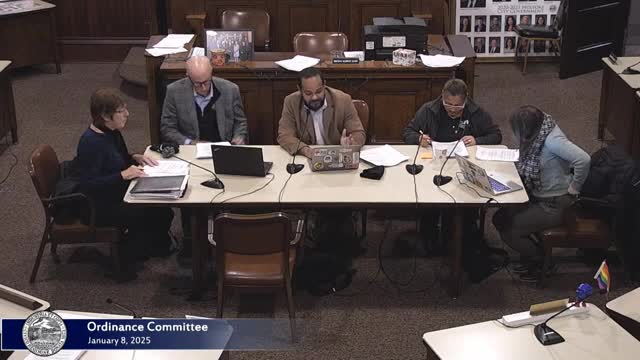Ordinance committee seeks draft ordinance, mayoral appropriation for municipal hearings officer required by state law
Get AI-powered insights, summaries, and transcripts
Subscribe
Summary
Holyoke committee discussed creating a municipal hearings officer position to hear building-code appeals, confirmed the city adopted M.G.L. c.40U in 2010, and asked the solicitor and mayor for draft ordinance language and an appropriation using a $25,100 baseline from M.G.L. c.148A §5.
The Holyoke City Ordinance Committee on Jan. 8, 2025 debated creating a municipal hearings officer to hear appeals of building-code fines and to set a stipend for the role, ultimately directing the city solicitor to draft ordinance language and asking the mayor for an appropriation. The committee noted state law requires such a position if a municipality adopts certain statutes.
City Solicitor Jane Mantoleski told the committee the city had adopted M.G.L. chapter 40U in 2010 but the adoption was not reflected in the municipal code; the office is working with the city clerk to update the code. Mantoleski and Building Commissioner Leslie Ward said the municipal hearings officer would hear appeals under the state building and fire codes and must complete state-mandated training. Ward and the solicitor said the position is commonly a third-party contractor rather than a city employee to preserve neutrality; the law department should not serve as the hearings officer because it could be the enforcing office in subsequent litigation.
The committee reviewed a November letter from the building commissioner and a draft ordinance prepared by the law department. Councilors asked for the statutory text and historical documentation. Councilor McGrath Smith requested examples of typical pay structures (an example from another regional council showed an annual stipend of $2,500 plus $150 per hearing). Councilor Bacon asked for the statute language to confirm any payment requirements.
Mantoleski confirmed the city adopted chapter 40U by council vote on May 4, 2010; the committee received committee and roll-call details for that adoption, which showed the committee recommended and the full council approved adoption in 2010. Committee members also discussed that, absent a municipal hearings officer, appeals and hearings have been required to be held in Springfield Housing Court or before the Board of Building Regulations and Standards (BBRS) in Boston, which can be expensive and intimidating for residents.
Committee members debated whether the hearings officer should be a contracted third party, an in‑house employee receiving a stipend on top of duties, or a shared regional contractor used by several communities. Councilor Bartley and others suggested using the fire department’s model (a retired chief contracted to handle hearings) as a precedent; staff agreed to obtain the historic stipend amount paid to that retired chief for comparison. Attorney Tashina Davis’s draft ordinance in the packet already included duties, qualifications and position description.
After discussion, the committee voted to request that the law department prepare draft ordinance language for committee review, and that the chair request a formal communication from the mayor indicating proposed appropriation for the stipend. Committee members cited M.G.L. c.148A (municipal hearings officer provisions) and M.G.L. c.40U (adopted 2010) as the legal basis. A committee member noted M.G.L. c.148A §5 includes a minimum stipend reference of $25,100 as a baseline to consider; Mantoleski said she found nothing in the 40U statute specifying pay but acknowledged 148A addresses minimums.
The committee did not appoint a specific person or set a stipend; the committee requested the draft ordinance, a history of any prior payments for the role, and a communication from the mayor about appropriation. The item will return to committee for review of the draft ordinance, stipend recommendation and any related appropriation language before being sent to the full City Council.
